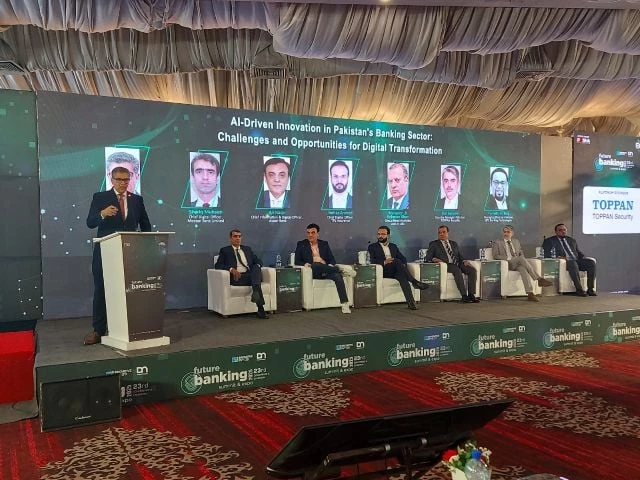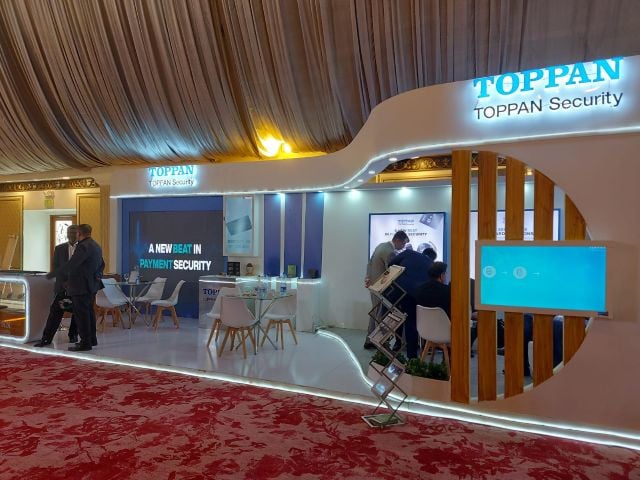Digital transformation shapes Pakistan's banking horizon
Innovations and ideas displayed here can revolutionise Pakistan's digital banking

The 23rd Future Banking Summit and Expo focused on the digital transformation of Pakistan’s banking space. Discussions at the summit highlighted how these innovations can streamline transactions, enhance customer experiences, and secure financial ecosystems for a tech-driven future.
A cashless ecosystem
Faisal Mahmood, head of Digital Public Infrastructure of Karandaaz, outlined the growth of automated teller machine (ATM) transactions and the increased use of point-of-sale (POS) machines since 2020. He said that there is “great adoption by the public” for the digital channels that banks offer, emphasising a need for banks to incentivise the usage of cashless alternatives, as Yahya Khan, Group Head and Chief Digital Officer (CDO) of Bank Alfalah, stated that Pakistan has the highest cash-to-GDP ratio among neighbouring countries.
Yahya talked about Pakistan’s direction with digital innovation and the need to move aggressively towards a cashless economy, adding that the transition towards a cashless economy is reliant on digital access points (DAPs). Merchants are reluctant to install these due to perceived costs of digital transactions, yet are unaware of the “hidden” costs of using cash, so it is important to have merchants install and use these DAPs, as there are around “one hundred million digitally enabled customers” ready to use these cashless methods and services. Ovais Habib Khan, Chief Operating Officer of TPS, echoed Yahya's point on people’s ignorance regarding the cost of handling cash.
Najeeb Agrawalla, CEO and Director of 1LINK, detailed PayPak’s plans, including the tokenization of PayPak by next year, bringing tap-to-pay and card-on-file features for users.
Another key feature of a cashless economy is the ability to recycle cash past banking hours. Fazal Rehman of Diebold Nixdorf explained that this would enhance user experience and solve the problem of cash flows getting frozen after banks close for the day.

Innovative Pvt Ltd at the Future Banking Summit and Expo. Photo credit: Express Tribune
Vendors such as TouchPoint and Innovative displayed cash and cheque recycling machines at the expo hall.
AI augmented banking
Rehman spoke about Pakistan’s history with digitisation and how incorporating AI into the bank’s infrastructure is the logical next step for Pakistan’s banks since according to him, “95% of teller transactions can be automated”.
“I don’t see any function, any area in the bank where you can’t apply it [AI]”. Meezan Bank CDO Shariq Mubeen added.
There is still a need to keep the human element as certain decisions and discretionary elements are needed. “Going forward, I see a lot of operational nature jobs going away, which is bad news as all of these people will become redundant.”
“These people can then be retrained, reskilled, and redeployed”.
CDO of Faysal Bank Aminur Rahman likened the incorporation of AI systems to the advent of the ATM. The existence of new technology did not remove the teller’s job; it simply evolved it.
Dr Aneel Salman, Chair of Economic Security at the Islamabad Policy Research Institute as well as of the National AI Policy Committee, spoke at length about the effects of AI on banking.
He said the deployment of AI on large scales would give bankers significant power, but would also magnify the need to use it ethically.
The benefits AI will confer would be interim, he warned. It will be the banks that bring in AI with “trust, culture, and strategy” that will stay ahead of others.
The effect AI has is vast: it approves loans in record time, prevents fraud in real time, and personalises financial advice. According to him, AI-driven underwriting could save banks $31 billion annually, and AI-powered fraud detection has cut false positives by 20%. “Banks adopting AI report 70% to 80% of their incremental value concentrated in just a handful of domains,” he noted.
The National AI Policy and fintech
Salman related the National AI policy’s six pillars directly to banking: innovation in fintech sandboxes would accelerate AI-based credit scoring, and training bankers in AI facilities would make them fluent in finance and machine learning. He said that AI will provide better cybersecurity and risk-model solutions, and will evolve public-private partnerships by streamlining remittances and microfinance systems.
He added that AI infrastructure can also bring high-performance computing that would “cut risk simulations from weeks to hours.”
Lastly, advancements in digital infrastructure would beget international partnerships, “linking Pakistan’s financial institutions to the global AI research standards and markets.”
“This is the bridge between vision and action.”
To these experts, AI is the next step in our financial evolution and will work alongside humans, not replace them.
New-age cybersecurity
AI both augments cybersecurity systems and weakens them. Country General Manager of CISCO Kashiful Haque said that AI can hack systems that would take humans hours or days to do within minutes. He added that there are never enough cybersecurity exercises a company or banking establishment could conduct, nor is there too much money to pour into cybersecurity.
The panel on cyber resilience discussed and concluded that constant and consistent investment in AI-powered solutions to augment cybersecurity is the only way to keep people’s data safe in the current age.
Business Development and Project Director of Toppan Security Sebastian Bautista provided their company’s solution to fraudulent practices: bank cards with dynamic card verification values (CVV), which prevent malicious actors from stealing card data by changing the CVV for every sale. This is useful to prevent ATM and POS machine skimming.

Toppan Security at the Future Banking Summit and Expo. Photo Credit: Express Tribune
However, other types of fraud, like phishing, are much harder to avoid as they prey on human ignorance rather than systemic faults.
Is this feasible?
Installing systems nationwide that allow cash recycling is no small task, and while people do use online payment methods, people with undeclared currency would still rather use cash-based systems which are harder to track, doing nothing to remedy the high cash-to-GDP ratio problem.
Getting POS machines to smaller merchants is an essential and lengthy first step to begin transitioning to a cashless economy, and incentivising merchants and consumers to use digital alternatives over cash will be difficult due to poor connectivity to banking systems and perceptions regarding taxation when using one over the other.
According to Tughral Ali, head of UBL Pay, Raast reduces the cost of transactions, a pain point for merchants. However, awareness of this is not widespread.
Installing AI infrastructure and training bankers on policy and uses will take time. Use cases, both internal and external, must first be made. Rehman states that AI must first be used to streamline internal processes and then be implemented on a large scale for external use, so it will be some time before we see AI implemented on the consumer-facing side of our banks.
Despite intentions to retrain workers previously performing "redundant" jobs, regulations would be required to prevent banks from skipping the retraining process by hiring workers already familiar with AI technology.
While there are hurdles to implementation, starting on small scales and gradually increasing our capacity would see a steady transition to a digital-based economy. The question remains if the financial sector can work in public and private domains to realise this future.



















COMMENTS (1)
Comments are moderated and generally will be posted if they are on-topic and not abusive.
For more information, please see our Comments FAQ